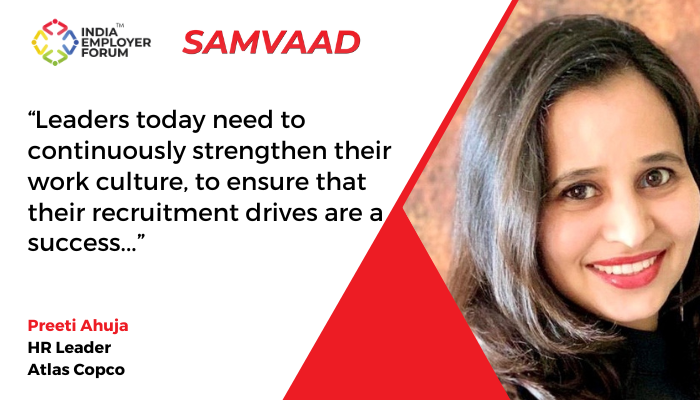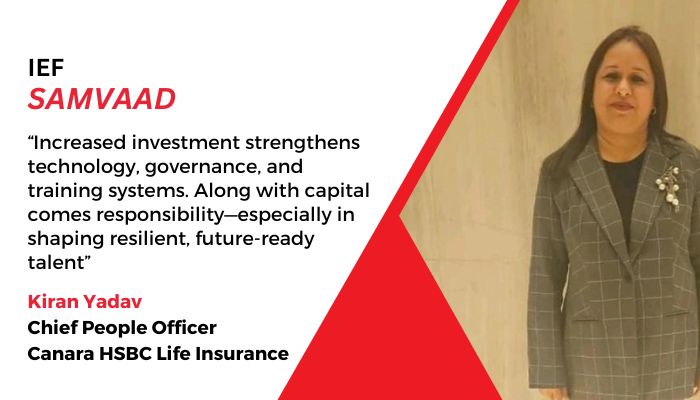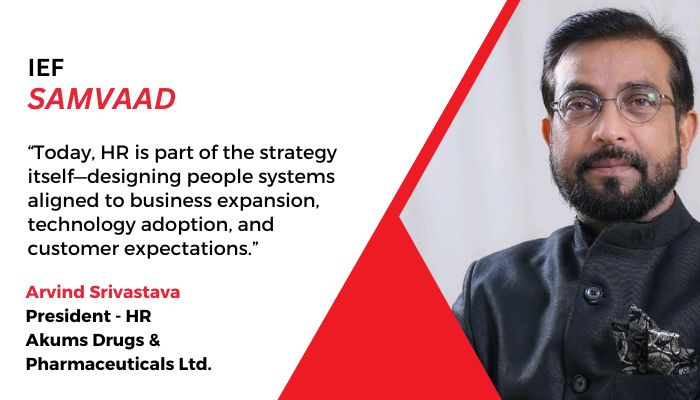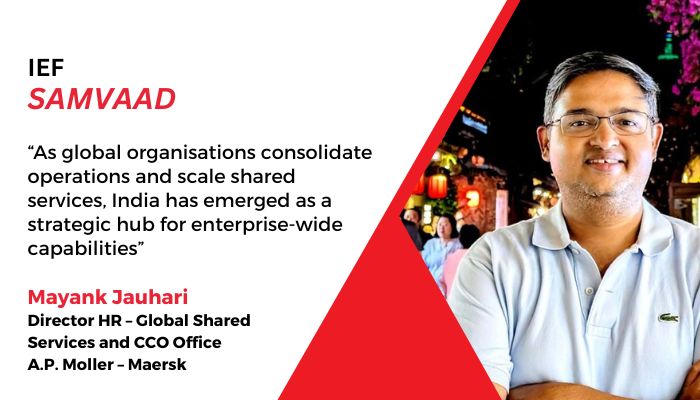Preeti Ahuja, HR Leader, Atlas Copco Group, speaks to India Employer Forum about shaping the organisational culture, nurturing progressive employee relations, driving inclusive culture, talent and organisational development.
Q. Tell us a little bit about yourself and your professional journey.
I began my career with a B.Sc in Statistics followed by an MBA in Human Resources, a Master’s degree in labour laws from Pune University, and an Executive Development Programme in Human Resources Management from XLRI Jamshedpur.
Over the years I have learned that people work for people, and being an inspirational manager, connecting with people, and earning their trust is crucial. As an HR leader, I am in charge of upholding the organisation’s culture, which entails making sure all decisions adhere to its goal, vision, and values. This involves promoting acculturation, encouraging teamwork, increasing engagement levels, and supporting individual growth through L&D activities.
I believe successful HR leaders must keep their ears to the ground to develop a clear understanding between larger organisational objectives and individual employee growth trajectories. The guiding principles that define my leadership style are humility, partnership building, coaching, employee empowerment, and employee engagement. In my opinion, recognizing employees’ achievements and empowering them rather than micromanaging, has a greater impact on fostering a strong work ethic and productivity within a firm.
Q. With the advent of new technologies, how has the role of HR changed in today’s world of work?
The seismic shift in HR’s roles, accelerated by the COVID-19 pandemic and the digital age, has seen HR professionals evolve from transactional administrators to integral partners in shaping organisational culture, employee engagement, and business strategy. Today, automation handles routine tasks, allowing HR to focus on its paramount mission: empowering the workforce through training, technology deployment, counselling, and enhancing the overall employee experience.
The use of data analytics and AI tools has enabled us to make more informed decisions, predict workforce trends, and create personalised employee experiences. We are no longer just HR professionals; we are change agents and advocates for employee empowerment. There is no one way to approach HR practices anymore, and if the last few years alone are any indication, it will keep evolving. This evolution has been exhilarating, demanding continuous learning and adaptability.
Q. In your experience can apprenticeships provide an opportunity to nurture talent and develop targeted skills keeping in view the future workforce needs of the organisation?
Apprenticeships are an invaluable tool for upskilling in areas that matter most to employers. They’re a highly effective route to recruit and train future talent, address skills shortages, and develop careers across core parts of your business.
Apprenticeships play a crucial role in addressing workforce needs by providing a pathway for individuals to develop the skills and knowledge required for specific industries, helping bridge the gap between employer demands and the available workforce.
This year’s National Apprenticeship Week theme is “Skills for Life.” From an employer’s perspective, investing in apprenticeships equates to investing in the future of their workforce. The theme of ‘Skills for Life’ emphasises how businesses can strategically cultivate a talent pipeline equipped with skills that go beyond immediate job requirements. Employers benefit from gaining access to a pool of skilled and motivated individuals trained to meet industry needs, thus fostering a culture of innovation and adaptability within the organisation.
Our apprentices are our workforce of the future. During the pandemic our apprentices have been flexible and adaptable to the changing needs of the service and ways of working, and always willing to go that extra mile with a smile. Our apprentices are a valuable part of our team.”
Q. Building Talent vs Buying Talent – where and how should an organisation prioritise? What programs are you deploying for employee development and continuous learning within the company?
The talent economy has become increasingly candidate and skill-driven. But with inflationary pressures, there is an urgent need today for HR professionals to reduce the costs of hiring talent while levelling up their efficacy in bridging the current skill gap. Today’s talent strategy has to be a win-win for the organisations and their workforce, and this can be achieved with a diversified hiring practice in place that can be broken down into the following three blocks:
Upskilling and internal mobility are vital to retaining your talent. It also plays a significant role in heightening productivity when top performers are identified and enrolled in customised L & D programs to enhance their skills. Organisations must also support skill-building by enabling the democratisation of career growth opportunities. This can be done by outlining critical competencies for each role. This can help employees align their interests to the needs of the business, invest in their upskilling to take on new roles and expand their current set of responsibilities.
New Hires are also an integral part of the growth of an organisation as they bring in fresh insights and new experiences that expose teams to a variety of different thought processes. However, while hiring new members of a team it is necessary to focus on LifeLong learners. Such candidates are invested in their self-growth and ready to take on new challenges by developing new skills. When it comes to reducing hiring costs, campus recruitment, and referrals are the most effective. A multi-marketing referral system that incentivizes referrals across departments can prove beneficial. The two components of building and buying talent can be interwoven in experiments such as the train-to-hire models of campus recruitment, where skilling programs unique to the business context are designed and rolled out on campuses. The top performers from these programs are then hired.
In today’s world, the rise of the gig economy and flexible employment models offers us the opportunity to hire highly skilled professionals on a part-time/contractual basis. Companies need to strategize on how to best leverage these opportunities to achieve business excellence and growth.
Through a diversified approach that has a bit of all three components mentioned above, you can maximise the returns of your hiring efforts. However, even with the best hiring strategy and skilling tools, there remains one critical element that HR leaders cannot overlook: employer branding. It helps to retain your talent and ensure the desired candidates want to work in your organisation.
Leaders today need to continuously strengthen their work culture, to ensure that their recruitment drives are a success, and their employees are engaged and productive. This needs to be supplemented with access to opportunities for their growth within the organisations. A resilient workforce invested in their self-growth then becomes the game changer in steering the business to new heights in the current disruptive world of work.
Q. What are your thoughts on employee development and leveraging work-based learning programs within the company?
Employee development and utilising work-based learning programs within the company are pivotal strategies amidst the evolving landscape of skill demands, especially driven by technological advancements. Professionals are increasingly recognizing the necessity of acquiring AI knowledge and its practical application to innovate and elevate their businesses. This juncture emphasises the importance of continuous learning to secure one’s career path, as well as the value of industry-specific expertise in contributing to organisational success.
In the current job market, continuous learning programs are indispensable for enhancing employees’ skills, performance, and overall contribution to the organisation. In this competitive environment, possessing cutting-edge skills is essential for staying ahead. Furthermore, learning and development play integral roles in organisational transformations, facilitating the alignment of existing talent with new goals and strategies.
Given the challenges posed by rising inflation, talent scarcity, and global supply constraints, learning and development leaders must adapt their strategies to foster synergy throughout the organisation. This includes tailoring learning initiatives to meet the diverse needs of employees across different age groups and fostering a culture of belongingness, particularly in hybrid and remote work setups. Human-centric learning solutions are paramount, emphasising the importance of long-term investments in people-related initiatives. Moreover, as the landscape of essential skills evolves, organisations must prioritise crisis management, goal clarity, and empathy among employees.
We as an organisation are nurturing a learning culture, adapting to the rise of generative AI tools, and identifying relevant skills to promote career mobility. We are also pivoting to language diversity in learning programs and shifting towards personalised, multi-level learning approaches to equip our workforce to meet the demands of the modern workforce.
About Preeti Ahuja
Preeti Ahuja is currently associated with Atlas Copco as an HR Leader. In her role, she plays a pivotal role in shaping the people & culture vision and roadmap for the company. She also helps uphold the diversity and inclusion goals, assisting the brand in evolving as a preferred global employer. She has done an MBA in Human Resources from the Indian Institute of Modern Management, Pune, and a Masters in Labour Laws from Pune University. She has also completed the Executive Development Programme in Human Resources Management from XLRI Jamshedpur. Preeti has been recognised as the ‘Top 10 Women Chief People Officers 2023’ by Women Entrepreneur India. She was also awarded Women Leader of the Year 2021 and Global Women Leader 2022 by the World Women Leadership Congress. Recently she was recognised and awarded for Corporate Excellence Award 2024.
Disclaimer: The opinions and views expressed in this article, including any accompanying data, are the sole responsibility of the author and should not be construed as reflecting the official policy or position of India Employer Forum.






